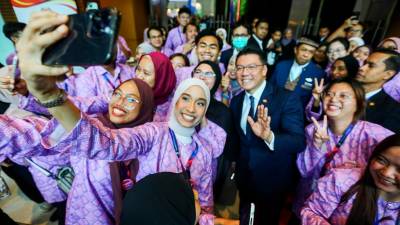KUALA LUMPUR: Malaysia must build cities that are not only liveable but “lovable” by embedding sustainability and inclusivity into every facet of urban development, said
UN-Habitat Assembly President and Housing and Local Government Minister Nga Kor Ming.
In his special keynote address at the Asean Sustainable Urbanisation Forum (ASUF), Asean Governors and Mayors Forum (AGMF) and Meeting of Governors and Mayors of Asean Capitals (MGMAC) yesterday, Nga outlined three core priorities for his ministry – housing, public infrastructure and waste management.
He said Malaysia has already achieved 98.4% of its 500,000 affordable homes target under the 12th Malaysia Plan, delivering 492,000 units.
The rebranded People’s Residency Programme will incorporate sustainable features such as rainwater harvesting, solar panels and urban farming spaces.
Through Urbanice Malaysia, the ministry has also rolled out the community hub initiative, in which unused public housing spaces are converted into community facilities, while Think City’s Kita Untuk Kita programme offers grants for the urban poor to improve and personalise their living environments.
On climate action, Nga said Malaysia is seeking US$20 million (RM84.6 million) from the Global Climate Adaptation Fund to implement nature-based solutions in the city alongside efforts to build 100 Madani parks each year. Last year, the target exceeded with 109 parks and 115 million trees planted under the Malaysian National Greenery Programme. The number of trees planted surpassed the original five-year goal of 100 million.
On waste management, Nga announced plans for 18 waste-to-energy plants across Peninsular Malaysia to help meet the national target of 70% renewable energy capacity by 2050.
“In 2023 alone, we spent more than RM2 billion on solid waste management, public cleaning, landfill operations and leachate treatment.
“By turning ‘trash into cash’ and ‘waste into energy’, we can manage waste sustainably while contributing to our renewable energy goals.”
Nga said the initiatives fall under the Circular Economy Blueprint for Solid Waste 2025–2035, led by the newly formed National Circular Economy Council, which will also enforce the Extended Producer Responsibility Policy framework.
Under the 13th Malaysia Plan, he said the ministry will expand the use of industrialised building systems and modular construction in public housing to reduce costs, noise pollution and waste.
He said transit-oriented development will also be integrated into future housing projects to improve access to jobs and education through public transport.
“These measures will not only cut pollution and costs but pave the way for a greener, more resource-efficient Malaysia.”
Nga urged Asean cities to align local policies with global frameworks such as the UN Sustainable Development Goals, New Urban Agenda and the Asean Smart Cities Network.
“The path to a better future begins at the local level and extends to the global stage. Malaysia invites all Asean member states to walk this journey with us.”
Deputy Prime Minister Datuk Seri Fadillah Yusof, who delivered an opening address at the forum, said Asean’s cities – which are home to more than 370 million people and generating 70% of the bloc’s gross domestic product – must be “living laboratories of sustainability and innovation”, ensuring no one is left behind as urbanisation accelerates.
“Urbanisation must be a force for equality, not division,” he said, urging Asean cities to embed inclusivity, embrace digital transformation and scale up proven climate solutions.
